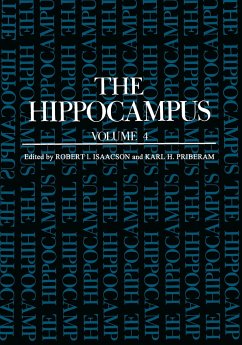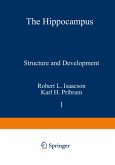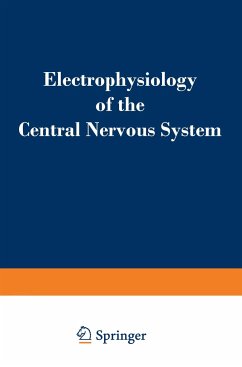The Hippocampus
Volume 4
Herausgegeben:Isaacson, R. L.; Pribram, K. H.
The Hippocampus
Volume 4
Herausgegeben:Isaacson, R. L.; Pribram, K. H.
- Broschiertes Buch
- Merkliste
- Auf die Merkliste
- Bewerten Bewerten
- Teilen
- Produkt teilen
- Produkterinnerung
- Produkterinnerung
The current volumes of The Hippocampus reflect the prodigious amount of work aimed at discovering the functions of this structure over the past decade. The hippocampus ideally lends itself to two types of study: (1) because of its regular and relatively simple cytoarchitecture, it can serve as a model for cortical processing in general, and (2) because of its size and central location, the role of the hippocampus in the total ecology of brain function poses an important challenge. We attempted to divide the contributions to Volumes 3 and 4 according to these two types of experimental aims. As…mehr
Andere Kunden interessierten sich auch für
![The Hippocampus The Hippocampus]() The Hippocampus39,99 €
The Hippocampus39,99 €![Mechanisms of Epileptogenesis Mechanisms of Epileptogenesis]() Mechanisms of Epileptogenesis74,99 €
Mechanisms of Epileptogenesis74,99 €![The Hippocampus The Hippocampus]() The Hippocampus77,99 €
The Hippocampus77,99 €![Electrophysiology of the Central Nervous System Electrophysiology of the Central Nervous System]() V. S. RusinovElectrophysiology of the Central Nervous System39,99 €
V. S. RusinovElectrophysiology of the Central Nervous System39,99 €![The Human Psyche The Human Psyche]() J. C. EcclesThe Human Psyche77,99 €
J. C. EcclesThe Human Psyche77,99 €![The Nervous System and Electric Currents The Nervous System and Electric Currents]() The Nervous System and Electric Currents39,99 €
The Nervous System and Electric Currents39,99 €![Neuronal Mechanisms of Hearing Neuronal Mechanisms of Hearing]() Neuronal Mechanisms of Hearing39,99 €
Neuronal Mechanisms of Hearing39,99 €-
-
-
The current volumes of The Hippocampus reflect the prodigious amount of work aimed at discovering the functions of this structure over the past decade. The hippocampus ideally lends itself to two types of study: (1) because of its regular and relatively simple cytoarchitecture, it can serve as a model for cortical processing in general, and (2) because of its size and central location, the role of the hippocampus in the total ecology of brain function poses an important challenge. We attempted to divide the contributions to Volumes 3 and 4 according to these two types of experimental aims. As always, however, when one makes dichotomies, one finds them inadequate in treating certain data and our attempt is no exception. There are contributions that do not fit the classification and there are others which fit both. In addition, there are manuscripts which we wanted to include but which the authors were not ready to submit at this time. Larry Squire, Mortimer Mishkin, and others aremaking important contributions which donot appear in these volumes except among references throughout. But this was also the case for Volumes 1 and 2 where we sorely miss the irreplaceable contributions of James Olds, Ross Adey, and Brenda Milner. Volume 4 is concerned primarily with the role of the hippocampus in the ecology of the brain in regulating behavior and experience. The contri butions have the potential to raise the level of our understanding considerably.
Produktdetails
- Produktdetails
- Verlag: Springer / Springer US / Springer, Berlin
- Artikelnr. des Verlages: 978-1-4615-8026-3
- Softcover reprint of the original 1st ed. 1986
- Seitenzahl: 400
- Erscheinungstermin: 8. März 2012
- Englisch
- Abmessung: 254mm x 178mm x 22mm
- Gewicht: 750g
- ISBN-13: 9781461580263
- ISBN-10: 1461580269
- Artikelnr.: 39512231
- Verlag: Springer / Springer US / Springer, Berlin
- Artikelnr. des Verlages: 978-1-4615-8026-3
- Softcover reprint of the original 1st ed. 1986
- Seitenzahl: 400
- Erscheinungstermin: 8. März 2012
- Englisch
- Abmessung: 254mm x 178mm x 22mm
- Gewicht: 750g
- ISBN-13: 9781461580263
- ISBN-10: 1461580269
- Artikelnr.: 39512231
1. An Executive Function of the Hippocampus: Pathway Selection for Thalamic Neuronal Significance Code.- 1. Introduction.- 1.1. Prologue.- 1.2. Working Assumptions.- 2. Methods: Discrete Lesions and Recording of Unit Activity during Discriminative Avoidance Behavior.- 2.1. Behavioral Training.- 2.2. Basic Tactics of the Approach.- 3. A Working Model for Limbic Telodiencephalic Function.- 3.1. Anatomical Focus.- 3.2. Involvement of Nonthalamic Projection Targets of the Cingulate Cortex in Contextual Priming of Learned Behaviors.- 3.3. Thalamic Nuclei as the Primary Sources of Associative CS-Elicited Neuronal Excitation of Cingulate Cortical Neurons.- 3.4. Elicitation of Primed Behavioral Responses by CS-Elicited Volleys of Thalamic Origin Projected through the Cingulate Cortex.- 3.5. Cingulate Cortical Limiting of Thalamic Activity and Behavior.- 3.6. Hippocampal Role in Pathway Selection.- 3.7. Interaction of Behavior-Limiting and -Inducing Pathways within Trials.- 3.8. Hippocampal Comparison Processes and Pathway Selection.- 4. Supporting Data.- 4.1. The AVN and the MDN as Sources of CS-Elicited Excitatory Drive of Cingulate Cortical Synaptic Circuitry.- 4.2. Cingulate Cortical Limiting of the AVN.- 4.3. Hippocampal Selection of the Limiting Pathway.- 4.4. Data Supporting the Model's Attributions of Behavioral Relevance to the Limbic Structures.- 4.5. Contextual Stimuli, Comparison Processes, and Priming.- 4.6. Brief Recapitulation.- 5. Implications for Human Memory Mechanisms.- 5.1. Neuropathology of Amnesia.- 5.2. Intact Functions.- 6. References.- 2. Brainstem Modulations of the Hippocampus: Anatomy, Physiology, and Significance.- 1. Introduction.- 2. Mechanisms of Theta Generation within the Hippocampus.- 3. The Cholinergic Septohippocampal Theta-Generating System.- 4. Brainstem Systems Controlling the Hippocampal EEG.- 4.1. Brainstem Stimulation Studies.- 5. Unit Activity of Brainstem Nuclei Implicated in the Generation of the Theta Rhythm.- 5.1. Pontine Reticular Formation.- 5.2. Midbrain RF, Locus Coeruleus, and Median Raphe.- 6. Ascending Brainstem-to-Septohippocampal Pathways Involved in the Control of the Hippocampal EEG.- 6.1. Stimulation Studies.- 6.2. Anatomical Studies.- 7. Significance of the Hippocampal Theta Rhythm.- 7.1. Septal Potentiation of Hippocampal Population Responses at CAI and the Dentate Gyrus.- 7.2. Potentiation of Hippocampal Population Responses during Theta-Associated Behaviors in Freely Moving Animals.- 7.3. A Possible Role for Theta in Long-Term Potentiation and Memory.- 8. General Summary and Conclusions.- 9. References.- 3. Behaviorally Dependent Neuronal Gating in the Hippocampus.- 1. Neuronal Gating.- 2. Brainstem Influences on Neuronal Gating.- 2.1. Serotonin.- 2.2. Reticular Formation.- 2.3. Norepinephrine.- 3. Discussion.- 4. References.- 4. Selective Hippocampal Lesions and Behavior: Implications for Current Research and Theorizing.- 1. Introduction.- 2. Neuroanatomical Considerations.- 3. Early Research Using Lesions Limited to Hippocampal Subregions.- 4. The Use of Neurotoxins to Selectively Lesion the Hippocampus.- 5. Behavioral Effects of Selective Neurotoxin Lesions.- 5.1. Experiments Designed to Study Hippocampal Involvement in Place versus Cue Learning and Working Memory versus Reference Memory.- 5.2. Other Experiments Involving Selective Neurotoxin Lesions of the Hippocampus.- 6. Implications for Theories of Hippocampal Function and Current Research in the Area.- 7. Summary and Conclusions.- 8. References.- 5. Cholinergic and Catecholaminergic Modification of the Hippocampal Lesion Syndrome.- 1. Early Attempts to Alleviate the Behavioral Impairments by External Manipulations.- 2. Secondary Neurochemical Changes Following Hippocampal Damage.- 3. Cholinergie Manipulations and Hippocampal Lesion Effects.- 4. Glucocorticoid Changes and Hippocampal Lesion Effects.- 5. An Analysis of Hippocampal Effects in the Open Field.- 5.1. Factor 1.- 5.2. Factor 2.- 5.3. Factor 3.- 5.4. Factor 4.- 6. Spontaneous Alternation.- 7. Conclusions.- 8. References.- 6. Comparator and Buffer Memory: An Attempt to Integrate Two Models of Hippocampal Function.- 1. The Hippocampus as a Comparator.- 1.1. Antianxiety Drug Action.- 1.2. Prolegomena to a Theory of Hippocampal Function.- 1.3. Gray's Theory of Hippocampal Function.- 1.4. Two Ways of Activating the SHS.- 2. The Hippocampus as a Memory Buffer.- 3. Relationship between the Models.- 3.1. Partial Reinforcement Experiments.- 3.2. An Attempted Resolution.- 4. Antianxiety Drugs and the Septhohippocampal System.- 5. Conclusions.- 6. References.- 7. Role of the Hippocampus in Classical Conditioning of Aversive and Appetitive Behaviors.- 1. Introduction.- 2. Hippocampal Unit Activity during Classical Conditioning of the NM and CJM Responses.- 2.1. Pyramidal and Theta Cell Responses during NM Conditioning.- 2.2. Hippocampal Unit Responses during CJM Conditioning.- 2.3. Dentate Granule Cell Responses during NM Conditioning.- 2.4. Hippocampal Slow Waves and NM Conditioning.- 3. Intrinsic Changes in the Hippocampus as a Result of Classical Conditioning: Evidence and Potential Mechanisms.- 4. Relationship between Hippocampal Neuronal Activity and Learned Behavior 22..- 4.1. Correlations between Hippocampal Unit Activity and Conditioned Behavior.- 4.2. Necessity of the Hippocampus for Complex but Not Simple Classical Conditioning Paradigms.- 4.3. Role of the Hippocampus in Delay Conditioning.- 4.4. Relationship of Hippocampal Neuronal Plasticity to Motoneuronal Activity Responsible for NM and CJM Movement.- 5. Multisynaptic Anatomical Pathways Underlying the Behavioral Consequences of Hippocampal Neuronal Plasticity.- 5.1. Projections to Retrohippocampal Brain Regions.- 5.2. Subcortical Targets.- 6. Summary.- 7. References.- 8. The Monkey and the Sea Horse.- 1. Introduction.- 2. Behavioral Profile of Adult Monkeys with Damage to the Hippocampal System.- 2.1. Bilateral Ablations of the Hippocampal Formation.- 2.2. Bilateral Sections of the Fornix.- 3. Effects of Hippocampal Damage as a Function of Age of Lesion.- 3.1. Subjects.- 3.2. Surgery and Histological Verification of Lesions.- 3.3. Methods.- 3.4. Results.- 4. Associative Learning Spared, Recognition and Associative Memory Not Spared, after Early Ablations of Hippocampus.- 4.1. Concurrent Object Discrimination Learning.- 4.2. Recognition Memory.- 4.3. Object Recognition Task: Delays.- 4.4. Object Recognition Task: Lists.- 4.5. Association Memory Task.- 4.6. Position Recognition Memory.- 5. Summary and Comments.- 6. Conclusions.- 7. References.- 9. Hippocampal Function and Memory for Temporal Context.- 1. Introduction.- 1.1. The Hippocampal System.- 1.2. Rats as an Animal Model.- 2. Comparative Cognition.- 2.1. Comparisons between Species.- 2.2. Comparisons through Lesion Analysis.- 3. Memory for the Temporal Context of an Event.- 4. Animal Tests of Working and Reference Memory.- 5. Memory for Temporal Intervals.- 6. Conclusions.- 7. References.- 10. Memory for Unique Instances: Temporal Lobe and Hippocampal Dependence.- 1. The Working Memory Model of Temporal Lobe Deficits.- 2. A New Animal Model of Temporal Lobe Memory Deficits.- 3. A Test of the Model.- 3.1. General Methods.- 3.2. Phase 1 of the Experiment.- 3.3. Phase 2 of the Experiment.- 3.4. Predictions and Results.- 4. Application of the Model to Cognitive Place Learning.- 4.1. Acquisition of Place.- 4.2. Reorientation to Place.- 4.3. Accessing Separate Events at One Place.- 5. The Value of Unique Instance Memories.- 6. Evaluation of the Model.- 6.1. Regulation in Relation to the Facts of a Unique Context.- 6.2. Regulation in Relation to a Recalled Instance.- 7. Conclusions.- 7.1. Retrograde Characteristics.- 7.2. Retroactive and Categorical Characteristics.- 8. References.- 11. The Hippocampal System and Recombinant Processing.- 1. Introduction.- 1.1. The Enigma.- 2. Limbic versus Nonlimbic Learning and Memory.- 2.1 Alternation versus Discrimination.- 2.2. Henry M..- 2.3. Discrimination Reversal.- 2.4. Effort.- 2.5. Competence.- 3. Hippocampus versus Amygdala: Novelty and Familiarity.- 3.1. Factors That Influence Processing Span.- 3.2. Discrimination Reversal.- 3.3. Learning, Extinction, and Relearning.- 3.4. Paired versus Scattered Stimuli.- 3.5. Massed versus Spaced Trials.- 3.6. Reaction to Novel Stimuli.- 3.7. Errors of Omission and of Commission.- 4. The Hippocampus and Competence.- 4.1. Orienting and Habituation.- 4.2. Alternation versus Delayed Response.- 4.3. Internally versus Externally Ordered Sequences.- 4.4. Spatial versus Nonspatial Tasks.- 4.5. Hippocampal Electrical Activity.- 4.6. Mechanism.- 4.7. Context-Sensitive Recombinant Processing.- 5. Whither Now?.- 5.1. Issues.- 5.2. Disparate Interpretations of Related Databases.- 5.3. Theoretical Frames and the Problem of Conscious Cognizance.- 6. References.
1. An Executive Function of the Hippocampus: Pathway Selection for Thalamic Neuronal Significance Code.- 1. Introduction.- 1.1. Prologue.- 1.2. Working Assumptions.- 2. Methods: Discrete Lesions and Recording of Unit Activity during Discriminative Avoidance Behavior.- 2.1. Behavioral Training.- 2.2. Basic Tactics of the Approach.- 3. A Working Model for Limbic Telodiencephalic Function.- 3.1. Anatomical Focus.- 3.2. Involvement of Nonthalamic Projection Targets of the Cingulate Cortex in Contextual Priming of Learned Behaviors.- 3.3. Thalamic Nuclei as the Primary Sources of Associative CS-Elicited Neuronal Excitation of Cingulate Cortical Neurons.- 3.4. Elicitation of Primed Behavioral Responses by CS-Elicited Volleys of Thalamic Origin Projected through the Cingulate Cortex.- 3.5. Cingulate Cortical Limiting of Thalamic Activity and Behavior.- 3.6. Hippocampal Role in Pathway Selection.- 3.7. Interaction of Behavior-Limiting and -Inducing Pathways within Trials.- 3.8. Hippocampal Comparison Processes and Pathway Selection.- 4. Supporting Data.- 4.1. The AVN and the MDN as Sources of CS-Elicited Excitatory Drive of Cingulate Cortical Synaptic Circuitry.- 4.2. Cingulate Cortical Limiting of the AVN.- 4.3. Hippocampal Selection of the Limiting Pathway.- 4.4. Data Supporting the Model's Attributions of Behavioral Relevance to the Limbic Structures.- 4.5. Contextual Stimuli, Comparison Processes, and Priming.- 4.6. Brief Recapitulation.- 5. Implications for Human Memory Mechanisms.- 5.1. Neuropathology of Amnesia.- 5.2. Intact Functions.- 6. References.- 2. Brainstem Modulations of the Hippocampus: Anatomy, Physiology, and Significance.- 1. Introduction.- 2. Mechanisms of Theta Generation within the Hippocampus.- 3. The Cholinergic Septohippocampal Theta-Generating System.- 4. Brainstem Systems Controlling the Hippocampal EEG.- 4.1. Brainstem Stimulation Studies.- 5. Unit Activity of Brainstem Nuclei Implicated in the Generation of the Theta Rhythm.- 5.1. Pontine Reticular Formation.- 5.2. Midbrain RF, Locus Coeruleus, and Median Raphe.- 6. Ascending Brainstem-to-Septohippocampal Pathways Involved in the Control of the Hippocampal EEG.- 6.1. Stimulation Studies.- 6.2. Anatomical Studies.- 7. Significance of the Hippocampal Theta Rhythm.- 7.1. Septal Potentiation of Hippocampal Population Responses at CAI and the Dentate Gyrus.- 7.2. Potentiation of Hippocampal Population Responses during Theta-Associated Behaviors in Freely Moving Animals.- 7.3. A Possible Role for Theta in Long-Term Potentiation and Memory.- 8. General Summary and Conclusions.- 9. References.- 3. Behaviorally Dependent Neuronal Gating in the Hippocampus.- 1. Neuronal Gating.- 2. Brainstem Influences on Neuronal Gating.- 2.1. Serotonin.- 2.2. Reticular Formation.- 2.3. Norepinephrine.- 3. Discussion.- 4. References.- 4. Selective Hippocampal Lesions and Behavior: Implications for Current Research and Theorizing.- 1. Introduction.- 2. Neuroanatomical Considerations.- 3. Early Research Using Lesions Limited to Hippocampal Subregions.- 4. The Use of Neurotoxins to Selectively Lesion the Hippocampus.- 5. Behavioral Effects of Selective Neurotoxin Lesions.- 5.1. Experiments Designed to Study Hippocampal Involvement in Place versus Cue Learning and Working Memory versus Reference Memory.- 5.2. Other Experiments Involving Selective Neurotoxin Lesions of the Hippocampus.- 6. Implications for Theories of Hippocampal Function and Current Research in the Area.- 7. Summary and Conclusions.- 8. References.- 5. Cholinergic and Catecholaminergic Modification of the Hippocampal Lesion Syndrome.- 1. Early Attempts to Alleviate the Behavioral Impairments by External Manipulations.- 2. Secondary Neurochemical Changes Following Hippocampal Damage.- 3. Cholinergie Manipulations and Hippocampal Lesion Effects.- 4. Glucocorticoid Changes and Hippocampal Lesion Effects.- 5. An Analysis of Hippocampal Effects in the Open Field.- 5.1. Factor 1.- 5.2. Factor 2.- 5.3. Factor 3.- 5.4. Factor 4.- 6. Spontaneous Alternation.- 7. Conclusions.- 8. References.- 6. Comparator and Buffer Memory: An Attempt to Integrate Two Models of Hippocampal Function.- 1. The Hippocampus as a Comparator.- 1.1. Antianxiety Drug Action.- 1.2. Prolegomena to a Theory of Hippocampal Function.- 1.3. Gray's Theory of Hippocampal Function.- 1.4. Two Ways of Activating the SHS.- 2. The Hippocampus as a Memory Buffer.- 3. Relationship between the Models.- 3.1. Partial Reinforcement Experiments.- 3.2. An Attempted Resolution.- 4. Antianxiety Drugs and the Septhohippocampal System.- 5. Conclusions.- 6. References.- 7. Role of the Hippocampus in Classical Conditioning of Aversive and Appetitive Behaviors.- 1. Introduction.- 2. Hippocampal Unit Activity during Classical Conditioning of the NM and CJM Responses.- 2.1. Pyramidal and Theta Cell Responses during NM Conditioning.- 2.2. Hippocampal Unit Responses during CJM Conditioning.- 2.3. Dentate Granule Cell Responses during NM Conditioning.- 2.4. Hippocampal Slow Waves and NM Conditioning.- 3. Intrinsic Changes in the Hippocampus as a Result of Classical Conditioning: Evidence and Potential Mechanisms.- 4. Relationship between Hippocampal Neuronal Activity and Learned Behavior 22..- 4.1. Correlations between Hippocampal Unit Activity and Conditioned Behavior.- 4.2. Necessity of the Hippocampus for Complex but Not Simple Classical Conditioning Paradigms.- 4.3. Role of the Hippocampus in Delay Conditioning.- 4.4. Relationship of Hippocampal Neuronal Plasticity to Motoneuronal Activity Responsible for NM and CJM Movement.- 5. Multisynaptic Anatomical Pathways Underlying the Behavioral Consequences of Hippocampal Neuronal Plasticity.- 5.1. Projections to Retrohippocampal Brain Regions.- 5.2. Subcortical Targets.- 6. Summary.- 7. References.- 8. The Monkey and the Sea Horse.- 1. Introduction.- 2. Behavioral Profile of Adult Monkeys with Damage to the Hippocampal System.- 2.1. Bilateral Ablations of the Hippocampal Formation.- 2.2. Bilateral Sections of the Fornix.- 3. Effects of Hippocampal Damage as a Function of Age of Lesion.- 3.1. Subjects.- 3.2. Surgery and Histological Verification of Lesions.- 3.3. Methods.- 3.4. Results.- 4. Associative Learning Spared, Recognition and Associative Memory Not Spared, after Early Ablations of Hippocampus.- 4.1. Concurrent Object Discrimination Learning.- 4.2. Recognition Memory.- 4.3. Object Recognition Task: Delays.- 4.4. Object Recognition Task: Lists.- 4.5. Association Memory Task.- 4.6. Position Recognition Memory.- 5. Summary and Comments.- 6. Conclusions.- 7. References.- 9. Hippocampal Function and Memory for Temporal Context.- 1. Introduction.- 1.1. The Hippocampal System.- 1.2. Rats as an Animal Model.- 2. Comparative Cognition.- 2.1. Comparisons between Species.- 2.2. Comparisons through Lesion Analysis.- 3. Memory for the Temporal Context of an Event.- 4. Animal Tests of Working and Reference Memory.- 5. Memory for Temporal Intervals.- 6. Conclusions.- 7. References.- 10. Memory for Unique Instances: Temporal Lobe and Hippocampal Dependence.- 1. The Working Memory Model of Temporal Lobe Deficits.- 2. A New Animal Model of Temporal Lobe Memory Deficits.- 3. A Test of the Model.- 3.1. General Methods.- 3.2. Phase 1 of the Experiment.- 3.3. Phase 2 of the Experiment.- 3.4. Predictions and Results.- 4. Application of the Model to Cognitive Place Learning.- 4.1. Acquisition of Place.- 4.2. Reorientation to Place.- 4.3. Accessing Separate Events at One Place.- 5. The Value of Unique Instance Memories.- 6. Evaluation of the Model.- 6.1. Regulation in Relation to the Facts of a Unique Context.- 6.2. Regulation in Relation to a Recalled Instance.- 7. Conclusions.- 7.1. Retrograde Characteristics.- 7.2. Retroactive and Categorical Characteristics.- 8. References.- 11. The Hippocampal System and Recombinant Processing.- 1. Introduction.- 1.1. The Enigma.- 2. Limbic versus Nonlimbic Learning and Memory.- 2.1 Alternation versus Discrimination.- 2.2. Henry M..- 2.3. Discrimination Reversal.- 2.4. Effort.- 2.5. Competence.- 3. Hippocampus versus Amygdala: Novelty and Familiarity.- 3.1. Factors That Influence Processing Span.- 3.2. Discrimination Reversal.- 3.3. Learning, Extinction, and Relearning.- 3.4. Paired versus Scattered Stimuli.- 3.5. Massed versus Spaced Trials.- 3.6. Reaction to Novel Stimuli.- 3.7. Errors of Omission and of Commission.- 4. The Hippocampus and Competence.- 4.1. Orienting and Habituation.- 4.2. Alternation versus Delayed Response.- 4.3. Internally versus Externally Ordered Sequences.- 4.4. Spatial versus Nonspatial Tasks.- 4.5. Hippocampal Electrical Activity.- 4.6. Mechanism.- 4.7. Context-Sensitive Recombinant Processing.- 5. Whither Now?.- 5.1. Issues.- 5.2. Disparate Interpretations of Related Databases.- 5.3. Theoretical Frames and the Problem of Conscious Cognizance.- 6. References.








